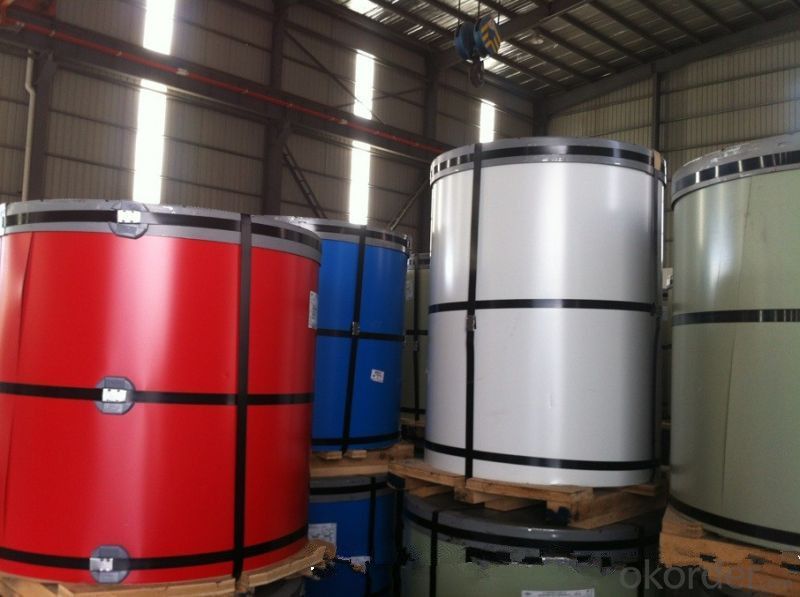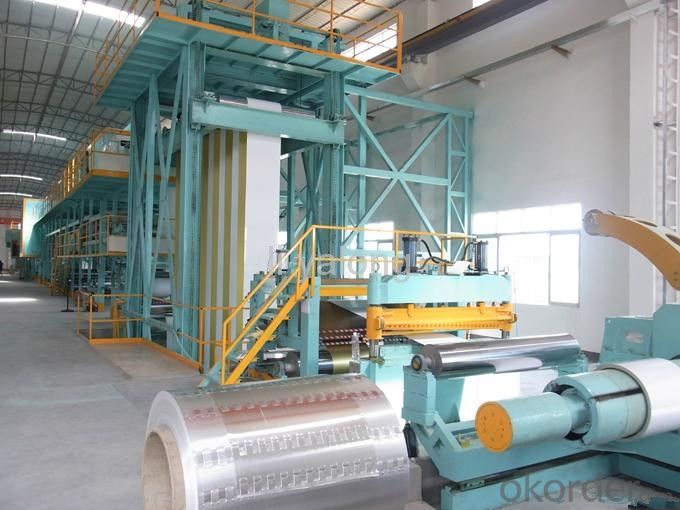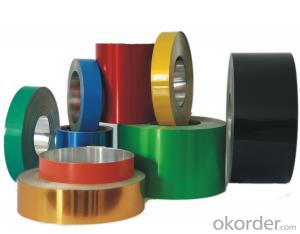RAL 8001 PE 18 Micros Coated Aluminium Coil
- Loading Port:
- Shanghai
- Payment Terms:
- TT OR LC
- Min Order Qty:
- 2 m.t.
- Supply Capability:
- 50000 m.t./month
OKorder Service Pledge
OKorder Financial Service
You Might Also Like
Item specifice
Description
Product | RAL 8001 PE 18 Micros Coated Aluminium Coil | ||
Alloy | 1100, 1145, 1050, 1060, 1070, 3003, 3013, 3005,etc. | Temper | H12.H14.H16.H18.H22. H24.H26.O etc. |
Thickness | 0.2-7.0mm | Width | Until 2550 |
Painting items | PE and PVDF | Color | All Standards of RAL |
Coil weight | At clients’ requestments | MOQ | 5 tons |
Payment terms | 30% down payment 70% against B/L copy, L/C at sight | ||
Delivery time | 20-30 days after getting your down payment | ||
Package | Wooden Pallet (Customized packing ways are welcomed) | ||
Remarks | The special dimensions can be produced according to clients’ specification | ||


PE and PVDF Painting
Polyester Coatings (PE)
PE (polyester) coatings exhibit an excellent combination of hardness, flexibility, flow, appearance, and superior resistance to dirt retention in indoor and outdoor applications. These coatings are highly resistant to abrasion, metal marking, staining, and marring, and require minimal maintenance. Glazetech uses polyester paints which provide excellent colour and gloss retention properties.
Polyvinylidene Fluoride Coatings (PVDF)
PVDF (polyvinylidene fluoride) is a chemical resistant thick film barrier coating commonly used in architectural applications where both excellent appearance and substrate protection must be maintained over a long period of time. This coating is unaffected by most chemicals and solvents and has excellent wear and abrasion resistance. PVDF also has a high dielectric strength, excellent resistance to weathering and the ability to self extinguish.
Application
Widely used in manufacturing of products as well as other industrial applications like:
Products Materials: PP cap stock, the traffic sign, air-conditioner heat and exchangers, food container, household foil, pharmaceutical packing, cigarettes packing etc.
Building Materials: aluminum curtain wall base plate, ACP, aluminum, ceilings, aluminum sheets, honeycomb panels and aluminum roofing, lighting decoration, household electrical appliances, food package (such as pop can cover & ring-pull), furniture ect.
FAQ
--Q: Do you provide free samples?
--A: Yes, free samples will be sent to you on freight at destination.
--Q: What is the MOQ?
--A: 2 tons
--Q: What kinds of alloy can you supply?
--A: 1000 series: 1050, 1060, 1070, 1100, 1145, 1200
3000 series: 3003, 3004, 3105, 3104
5000 series: 5052, 5083, 5754, 5182
6000 series: 6061, 6063, 6062, 6063
8000 series: 8011, 8021
--Q: What kinds of temper can you supply?
--A: O-H112: O,H12,H14,H16,H18,H22,H24,H26,H,32,H34,H111,H112
T3, T4, T6
- Q:Can aluminum coils be used in solar panel applications?
- Yes, aluminum coils can be used in solar panel applications. Aluminum is a lightweight, durable, and corrosion-resistant material that is commonly used in the construction of solar panels. It is often used as a component in the frame or as a backsheet material, providing structural support and protection to the solar cells.
- Q:What are the common testing methods for aluminum coils?
- Some common testing methods for aluminum coils include visual inspection, dimensional measurements, hardness testing, corrosion resistance testing, tensile strength testing, and conductivity testing. These methods help ensure the quality and performance of aluminum coils in various applications.
- Q:Its currently 3 AM so i can't check, but my question is:does aluminum rust slower/faster than other metals? I've basically had this bike for about 6 years, but only rid it once. Its been sitting in my backyard under a roof (safe from rain) for 6+ years. Is it safe to ride it? Also, bonus question: Does having a bike on campus make life 10x easier?
- Aluminium could fracture without warning especially as the bike has been neglected for so long -all rubbers would probably need replacing cables is it some sort of collectors item? If not and you are just using it on campus ditch it and get a new bike (from a dealer) nothing fancy maybe add a rack for your books
- Q:How to calculate the weight of strips with the weight of aluminum coil known?
- Thickness*width*length=weight/density, length=weight/(density*thickness*width).Ps: Keep unit the same.
- Q:ok me and my father are trying to make thermite. we have the iron oxide but the aluminum we only have paste and i was wondering would it work the same as if we had the powder.and if it is differnt will it work for the thermite and what will it take to light it.
- Etch A Sketch Thermite
- Q:What are the different thickness options for aluminum coils?
- Aluminum coils are available in a wide range of thickness options to cater to various industrial and commercial applications. The thickness of aluminum coils is typically measured in gauge or millimeters (mm). Common thickness options for aluminum coils include: 1. Thin Gauge: Thin gauge aluminum coils are usually between 0.15 mm to 0.4 mm thick. These coils are commonly used for applications that require lightweight and flexible materials, such as packaging, electrical wiring, and insulation. 2. Standard Gauge: Standard gauge aluminum coils range from 0.4 mm to 2.5 mm in thickness. These coils are widely used in industries like construction, automotive, and aerospace for applications such as roofing, cladding, heat exchangers, and structural components. 3. Thick Gauge: Thick gauge aluminum coils are typically above 2.5 mm in thickness. These coils are predominantly used in heavy-duty applications that require high strength, durability, and load-bearing capacity. Examples include shipbuilding, industrial machinery, and large-scale structural frameworks. It's important to note that the availability of specific thickness options may vary depending on the manufacturer and the intended application. Custom thicknesses can also be manufactured to meet specific project requirements.
- Q:How are aluminum coils protected against corrosion during storage?
- Aluminum coils are protected against corrosion during storage through various methods and precautions. One common method is the application of a protective coating or film on the surface of the coils. This coating acts as a barrier, preventing moisture and oxygen from coming into direct contact with the aluminum, which helps to prevent corrosion. Another method is the use of desiccants or moisture-absorbing materials. These materials are often placed inside the packaging or storage containers with the aluminum coils to absorb any moisture that may be present. By reducing the moisture content in the storage environment, the risk of corrosion is significantly minimized. In addition, proper storage conditions play a crucial role in protecting aluminum coils against corrosion. Storing the coils in a dry, well-ventilated area away from direct sunlight and other sources of moisture is essential. It is also important to ensure that the coils are stored off the ground and away from any chemicals or substances that could potentially cause corrosion. Regular inspections and maintenance are also necessary to prevent corrosion during storage. This includes checking for any signs of damage or wear on the protective coating and promptly addressing any issues that may arise. Additionally, maintaining a clean storage environment free from dust, dirt, and other contaminants will help in preserving the integrity of the protective coating and preventing corrosion. Overall, a combination of protective coatings, moisture-absorbing materials, proper storage conditions, and regular maintenance is essential for effectively protecting aluminum coils against corrosion during storage. These measures help to ensure that the coils remain in optimal condition and are ready for use when needed.
- Q:i dont want aluminum cookware, but how about a stainless steel set with an aluminum core. Is this the same as aluminum pots and pans? Thanks.
- The aluminum is encased in the stainless steel, usually as a thick disk in the bottom. It is an excellent conductor of heat and holds the heat well once it gets hot. All you see is the stainless, none of the aluminum because it's between two layers of stainless in the bottom of the pots. You are right, you don't want food cooked in straight aluminum, some metal taste can transfer to certain foods. That won't happen with stainless.
- Q:What are the potential applications of coil-anodized aluminum coils?
- Coil-anodized aluminum coils possess unique properties and advantages, allowing them to be employed in a wide range of potential applications. Here are some of the primary areas where they can be utilized: 1. Architectural: The distinct properties of coil-anodized aluminum make it well-suited for architectural purposes, including cladding, roofing, and facades. With its anodized coating, it offers increased durability, resistance to weather conditions, and color stability, making it suitable for outdoor use in various climates. Furthermore, the coils can be shaped and formed to create different architectural elements, providing design flexibility. 2. Transportation: Due to its lightweight nature, coil-anodized aluminum is ideal for transportation applications. It can be employed in the manufacturing of parts and components for the automotive, aerospace, and marine industries. The anodized coating enhances its corrosion resistance, making it suitable for exterior components and structures. 3. Electronics: Coil-anodized aluminum coils find utility in the field of electronics manufacturing. The anodized coating provides excellent electrical insulation, which is crucial in applications necessitating high conductivity and insulation. It can be utilized in the production of components such as heat sinks, casings, and connectors. 4. Signage and displays: The vibrant and long-lasting colors achieved through coil-anodizing make it a perfect material for signage and displays. The anodized coating ensures color stability against UV radiation and harsh weather conditions, rendering it suitable for both indoor and outdoor applications. It enables the creation of eye-catching and durable signage and displays. 5. Furniture and interior design: Coil-anodized aluminum coils can be employed in the manufacture of furniture and interior design elements. The anodized coating provides a smooth, durable, and scratch-resistant surface, making it suitable for applications like tables, chairs, wall panels, and decorative elements. The wide range of available colors and finishes allows for versatile design possibilities. 6. Industrial applications: Coil-anodized aluminum coils can be utilized in diverse industrial sectors. The anodized coating offers enhanced corrosion resistance, which is advantageous in industries such as chemical processing, food processing, and pharmaceuticals. It can be used in the production of tanks, containers, and equipment that require resistance against harsh chemicals and environments. 7. Energy and sustainable applications: The lightweight nature and durability of coil-anodized aluminum make it suitable for energy and sustainable applications. It can be employed in the manufacturing of solar panels, heat exchangers, and other energy-related components. The anodized coating provides protection against weathering and corrosion, ensuring long-term performance. In conclusion, coil-anodized aluminum coils have extensive and diverse potential applications, spanning across architectural, transportation, electronics, signage, furniture, industrial, and energy sectors. The combination of its lightweight nature, durability, color stability, and corrosion resistance makes it a versatile material for various industries and applications.
- Q:An they say aluminum can cause breast cancer in some.
- You bet it does......its a compound called aluminum chlorhydrate. Its made by reacting aluminum with hydrochloric acid. Actually they use aluminum hydroxide to prevent a potential explosion hazard during the manufacturing process. Aluminium-based complexes (chlorhydrates) react with the electrolytes in the sweat to form a gel plug in the duct of the sweat gland. The plugs prevent the gland from excreting liquid and are removed over time by the natural sloughing of the skin. The aluminum salts interact with the keratin fibrils in the sweat ducts and form a physical plug that prevents sweat from reaching the skin’s surface. Aluminum salts also have a slight astringent affect on the pores; causing them to contract, further preventing sweat from reaching the surface of the skin. The blockage of a large number of sweat glands reduces the amount of sweat produced in the underarms, though this may vary from person to person. Aluminum is considered a heavy metal and has been shown (in its elemental form only) to alter the physiology of the blood-brain barrier. Antiperspirants are considered drugs by the FDA and no test yet performed shows a link between Aluminum chlorhydrate and breast cancer, brain cancer or any other cancer for that matter. Hey, you asked......
1. Manufacturer Overview |
|
|---|---|
| Location | |
| Year Established | |
| Annual Output Value | |
| Main Markets | |
| Company Certifications | |
2. Manufacturer Certificates |
|
|---|---|
| a) Certification Name | |
| Range | |
| Reference | |
| Validity Period | |
3. Manufacturer Capability |
|
|---|---|
| a)Trade Capacity | |
| Nearest Port | |
| Export Percentage | |
| No.of Employees in Trade Department | |
| Language Spoken: | |
| b)Factory Information | |
| Factory Size: | |
| No. of Production Lines | |
| Contract Manufacturing | |
| Product Price Range | |
Send your message to us
RAL 8001 PE 18 Micros Coated Aluminium Coil
- Loading Port:
- Shanghai
- Payment Terms:
- TT OR LC
- Min Order Qty:
- 2 m.t.
- Supply Capability:
- 50000 m.t./month
OKorder Service Pledge
OKorder Financial Service
Similar products
New products
Hot products
Related keywords




























